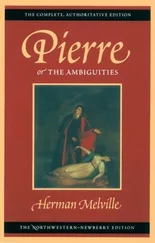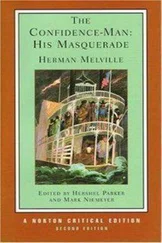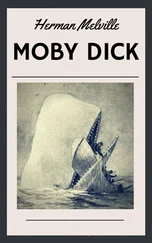"Don't know where you were born? — Who was your father?"
"God knows, Sir."
Struck by the straightforward simplicity of these replies, the officer next asked, "Do you know anything about your beginning?"
"No, Sir. But I have heard that I was found in a pretty silklined basket hanging one morning from the knocker of a good man's door in Bristol."
" Found say you? Well," throwing back his head and looking up and down the new recruit; "Well, it turns out to have been a pretty good find. Hope they'll find some more like you, my man; the fleet sadly needs them."
Yes, Billy Budd was a foundling, a presumable by-blow, and, evidently, no ignoble one. Noble descent was as evident in him as in a blood horse.
For the rest, with little or no sharpness of faculty or any trace of the wisdom of the serpent, nor yet quite a dove, he possessed that kind and degree of intelligence going along with the unconventional rectitude of a sound human creature, one to whom not yet has been proffered the questionable apple of knowledge. He was illiterate; he could not read, but he could sing, and like the illiterate nightingale was sometimes the composer of his own song.
Of self-consciousness he seemed to have little or none, or about as much as we may reasonably impute to a dog of Saint Bernard's breed.
Habitually living with the elements and knowing little more of the land than as a beach, or, rather, that portion of the terraqueous globe providentially set apart for dance-houses, doxies and tapsters, in short what sailors call a "fiddlers'-green," his simple nature remained unsophisticated by those moral obliquities which are not in every case incompatible with that manufacturable thing known as respectability. But are sailors, frequenters of "fiddlers'-greens," without vices? No; but less often than with landsmen do their vices, so called, partake of crookedness of heart, seeming less to proceed from viciousness than exuberance of vitality after long constraint; frank manifestations in accordance with natural law. By his original constitution aided by the cooperating influences of his lot, Billy in many respects was little more than a sort of upright barbarian, much such perhaps as Adam presumably might have been ere the urbane Serpent wriggled himself into his company.
And here be it submitted that apparently going to corroborate the doctrine of man's fall, a doctrine now popularly ignored, it is observable that where certain virtues pristine and unadulterate peculiarly characterize anybody in the external uniform of civilization, they will upon scrutiny seem not to be derived from custom or convention, but rather to be out of keeping with these, as if indeed exceptionally transmitted from a period prior to Cain's city and citified man. The character marked by such qualities has to an unvitiated taste an untampered-with flavor like that of berries, while the man thoroughly civilized, even in a fair specimen of the breed, has to the same moral palate a questionable smack as of a compounded wine. To any stray inheritor of these primitive qualities found, like Caspar Hauser, wandering dazed in any Christian capital of our time, the good-natured poet's famous invocation, near two thousand years ago, of the good rustic out of his latitude in the Rome of the Cesars, still appropriately holds: -
"Honest and poor, faithful in word and thought,
What has thee, Fabian, to the city brought?"
Though our Handsome Sailor had as much of masculine beauty as one can expect anywhere to see; nevertheless, like the beautiful woman in one of Hawthorne's minor tales, there was just one thing amiss in him. No visible blemish, indeed, as with the lady; no, but an occasional liability to a vocal defect. Though in the hour of elemental uproar or peril he was everything that a sailor should be, yet under sudden provocation of strong heart-feeling, his voice otherwise singularly musical, as if expressive of the harmony within, was apt to develop an organic hesitancy, in fact, more or less of a stutter or even worse. In this particular Billy was a striking instance that the arch interferer, the envious marplot of Eden, still has more or less to do with every human consignment to this planet of earth. In every case, one way or another he is sure to slip in his little card, as much as to remind us — I too have a hand here.
The avowal of such an imperfection in the Handsome Sailor should be evidence not alone that he is not presented as a conventional hero, but also that the story in which he is the main figure is no romance.
At the time of Billy Budd's arbitrary enlistment into the Indomitable that ship was on her way to join the Mediterranean fleet. No long time elapsed before the 'unction was effected. As one of that fleet the seventy-four participated in its movements, tho' at times, on account of her superior sailing qualities, in the absence of frigates, despatched on separate duty as a scout and at times on less temporary service. But with all this the story has little concernment, restricted as it is to the inner life of one particular ship and the career of an individual sailor.
It was the summer of 1797. In the April of that year had occurred the commotion at Spithead followed in May by a second and yet more serious outbreak in the fleet at the Nore. The latter is known, and without exaggeration in the epithet, as the Great Mutiny. It was indeed a demonstration more menacing to England than the contemporary manifestoes and conquering and proselyting armies of the French Directory.
To the British Empire the Nore Mutiny was what a strike in the fire-brigade would be to London threatened by general arson. In a crisis when the kingdom might well have anticipated the famous signal that some years later published along the naval line of battle what it was that upon occasion England expected of Englishmen; that was the time when at the mast-heads of the three-deckers and seventy-fours moored in her own roadstead — a fleet, the right arm of a Power then all but the sole free conservative one of the Old World — the blue-jackets, to be numbered by thousands, ran up with huzzas the British colors with the union and cross wiped out; by that cancellation transmuting the flag of founded law and freedom defined, into the enemy's red meteor of unbridled and unbounded revolt. Reasonable discontent growing out of practical grievances in the fleet had been ignited into irrational combustion, as by live cinders blown across the Channel from France in flames.
The event converted into irony for a time those spirited strains of Dibdin — as a song-writer no mean auxiliary to the English Government at the European conjuncture — strains celebrating, among other things, the patriotic devotion of the British tar:
"And as for my life, 'tis the King's!"
Such an episode in the Island's grand naval story her naval historians naturally abridge; one of them (G.P.R. James) candidly acknowledging that fain would he pass it over did not "impartiality forbid fastidiousness." And yet his mention is less a narration than a reference, having to do hardly at all with details. Nor are these readily to be found in the libraries. Like some other events in every age befalling states everywhere, including America, the Great Mutiny was of such character that national pride along with views of policy would fain shade it off into the historical background. Such events can not be ignored, but there is a considerate way of historically treating them. If a well-constituted individual refrains from blazoning aught amiss or calamitous in his family, a nation in the like circumstance may without reproach be equally discreet.
Though after parleyings between Government and the ringleaders, and concessions by the former as to some glaring abuses, the first uprising — that at Spithead — with difficulty was put down, or matters for the time pacified; yet at the Nore the unforeseen renewal of insurrection on a yet larger scale, and emphasized in the conferences that ensued by demands deemed by the authorities not only inadmissible but aggressively insolent, indicated — if the Red Flag did not sufficiently do so — what was the spirit animating the men. Final suppression, however, there was; but only made possible perhaps by the unswerving loyalty of the marine corps and voluntary resumption of loyalty among influential sections of the crews.
Читать дальше












